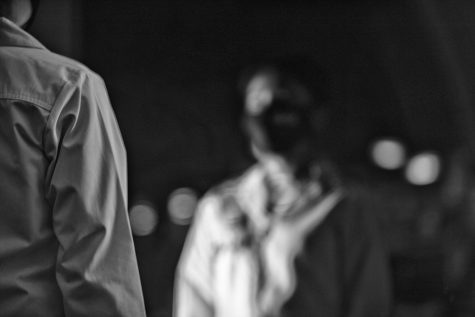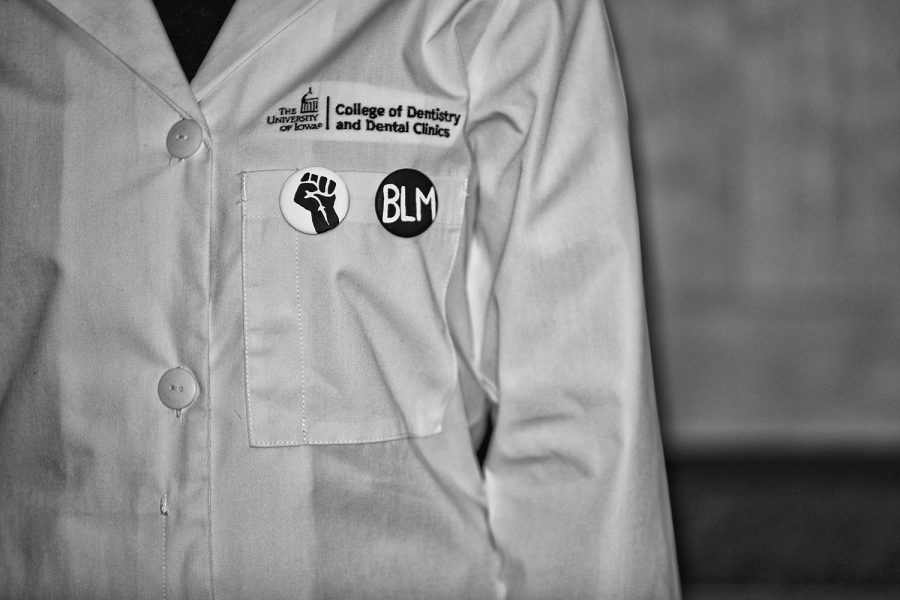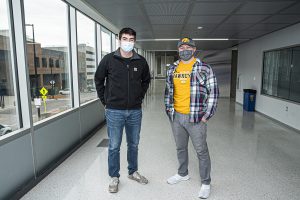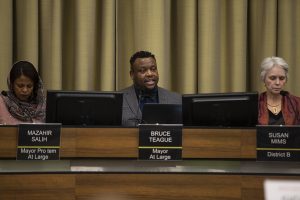‘Isolated and anxious:’ University of Iowa dental students react to an email thread and remarks made within their college
To several College of Dentistry students, a public email thread in which a professor disavowed BLM marked an erosion of trust and a fear for what’s next.
A University of Iowa College of Dentistry student poses for a portrait in the Adler Journalism Building on Sunday Nov. 29, 2020.
December 1, 2020
On Oct. 19, Megha Puranam was sitting in her classroom rotating through her clinics as a third-year University of Iowa dental student. While waiting for patients to arrive, she observed conversations erupting about an email thread earlier that weekend in which her fellow classmates were debating the college’s decision to condemn President Trump’s Executive Order that placed a halt on diversity, equity, and inclusion training programs at the University of Iowa. After hearing her peers in the classroom speak to her about cultural competency and diversity, equity, and inclusion not having a place at the UI, she left the room feeling hurt and discriminated against.
“I left the room crying — I cried twice,” Puranam, a proud Indian American woman, said. “The third time, I sought counseling.”
For many students of underrepresented identities in the College of Dentistry, enrolling at the UI was an opportunity to be surrounded by individuals of color, LGBTQ identities, or other identities like their own. After one ‘reply-all’ to the dental college surfaced questioning the college’s condemnation of the White House order, many students, faculty, and staff in the college who currently serve as peers and mentors for the students weighed in. The email thread for many was a triggering message that unraveled the college and UI’s diversity, equity, and inclusion efforts, erupting quickly into a debate of first amendment freedom of speech rights and the call for sensitivity.
As previously reported in The Daily Iowan, several of the college’s members weighed in on an email thread after the college administration stated that UI College of Dentistry leadership strongly condemned Executive Order 13950. The condemnation email from the administration said that the order “prohibits trainings that are crucial to progressing toward a more equitable and just society.” The college’s email list service reaches about 1,200 individuals in the college’s community.
Many dentistry students pointed to the emails that they found offensive due to the remarks on diversity, equity, and inclusion efforts and voiced their concerns with peers or administrators. While some faculty members questioned the intentions of the order, one professor disavowed the Black Lives Matter movement and questioned diversity, equity, and inclusion efforts.
After hearing what their faculty members had to say, the students have continued to attend classes despite not knowing other students’ views of DEI, leaving an uneasy environment for them. For Puranam, 26, and others, they have for weeks felt “isolated and anxious,” Puranam said.
Students hear from their faculty members
Puranam is not alone in hearing the conversations within her school environment and feeling unsafe. Makinzee Thomas, a dental student and proud woman of color within the college was shocked to read the thread and see a professor disavow the Black Lives Matter movement in the thread discussing the Executive Order.
In the thread, Assistant in Instruction in the Department of Periodontics Nancy Slach replied with her support for the Executive Order. Trump’s order states that a federal contractor shall not use any workplace training that “inculcates in its employees any form of race or sex stereotyping or any form of race or sex scapegoating.”
Slach wrote in her response to the public email thread that all individuals in the country are created equal and should be allowed an equal opportunity under the law to prosper based on individual merit.
As previously reported in the DI, the executive order, signed by Trump on Sept. 22, states that a federal contractor shall not use any workplace training that “inculcates in its employees any form of race or sex stereotyping or any form of race or sex scapegoating,” including, but not limited to, the following concepts:
- one race or sex is inherently superior to another race or sex
- an individual, by virtue of his or her race or sex, is inherently racist, sexist, or oppressive, whether consciously or unconsciously
- an individual’s moral character is necessarily determined by his or her race or sex
- an individual, by virtue of his or her race or sex, bears responsibility for actions committed in the past by other members of the same race or sex
- any individual should feel discomfort, guilt, anguish, or any other form of psychological distress on account of his or her race or sex
- meritocracy or traits such as a hard work ethic are racist or sexist, or were created by a particular race to oppress another race
“Until this time, it has been difficult, if not impossible to speak out about the training and ‘education’ we are receiving that I believe is not beneficial,” Slach wrote in her email within the thread. “I think much of the information produced by the University is subtle and trying to have us conform to the liberal viewpoint. I for one cannot support Black Lives Matter. I do not think this organization is what many think it is.”
Thomas said she immediately felt uncomfortable with what Slach wrote about the movement and other messages sent to the entire college.
“What hurt my feelings was seeing it escalating to what it did and to have Black Lives Matter get brought into it,” Thomas said.
Thomas pursued dental colleges outside of her hometown in Washington state, looking from coast to coast before settling on Iowa.
“I did not apply to schools in the south, because I know being a Black woman that I may face some issues down there,” Thomas said. “I’m not trying to generalize that area, but I chose Iowa because I thought this would be a safe place for me.”
She found herself at Iowa with the hopes that the institution would practice the values preached during her admissions search, such as the UI’s core pillars in promoting diversity, that made her excited to choose the college.
Thomas spent the weekend crying over the words from the dental community. She lost concentration to the point where she rescheduled part one of her Board Examination with the American Dental Association. The emails had driven her to a point of not leaving her bedroom and crying hysterically.
“I don’t know who my allies are,” Thomas said. “I don’t know who will denounce Black Lives Matter like that or people who are against DEI training.”
Slach did not respond to the DI’s multiple requests for comment.
Other professors weighed in too. Assistant Professor in the Department of Preventive and Community Dentistry Susan McKernan argued in an email that the executive order was a dog whistle, also emailing her thoughts to the entire college.
“The President made it explicitly clear that he is targeting DEI trainings that imply white people have some sort of privilege over Black, Indigenous, and people of color in this country …” McKernan wrote in her email.
McKernan declined the DI’s request for comment.
For Dental Student Jasmine Butler, the hurt came from her general thoughts that the adults in positions of authority in her college could not be trusted to uphold values of diversity, equity, and inclusion. Reading emails from individuals that were supposed to be her mentors made her fear potential confrontations.

“People of color have had to deal with [these situations] their entire lives,” Butler said. “It being brought to light has validated everything they have ever felt.”
The University of Iowa Graduate and Professional Student Government issued a statement supporting students who had felt the impact of the mass email thread within the UI College of Dentistry that sparked a debate around Trump’s Executive Order.
The statement, signed by the Graduate Professional Student Government diversity, equity, and inclusion committee and executive team, stated that dental students have reported heightened tensions, a sense of politically charged unrest, and incidents of microaggressions within the College of Dentistry.
“Everywhere on the University of Iowa campus should be inclusive and respectful — particularly in spaces dedicated to learning — so that students can freely concentrate on their education without distraction. When intolerance is explicitly or implicitly present in educational environments, students are forced to dedicate valuable time and energy toward navigating these issues, while also fighting to maintain a semblance of health and well-being,” the statement, posted Nov. 7, read.
Disciplinary actions rescinded
More than three weeks after the initial email, Michael Brase, the student that initiated the email thread, was notified he would undergo a disciplinary hearing from a college committee. The hearing was withdrawn after lawmakers contacted the college, a move that left students the DI spoke with uneasy and shocked.
Butler said when she’d heard a student within the thread had been given a disciplinary hearing that was later rescinded by the college, she said she found that decision extremely offensive because of the eruption that ensued after the thread.
Brase said he began the thread to seek an understanding of why the college had condemned the Executive Order.
“I don’t regret speaking to the college,” Brase said. “Although it is stressful, the fact that it has become what it has, only serves [to say] it is important that we highlight these issues and that there is freedom of speech.”
Brase said he was notified Nov. 9 of a Professional Misconduct Review hearing by the Collegiate Academic and Professional Performance Committee. The hearing was slated for Nov. 23 based on “unprofessional behavior involving the follow-up emails” sent out on a public platform after other means were provided to continue the conversation.
According to the Collegiate Academic and Professional Performance Committee manual, disciplinary hearings and probations are primarily for violations of professional ethics brought to the official attention of the committee. The general rule, according to the manual, is that the student would remain on disciplinary probation for the remainder of their time in dental school.
Once Brase read the emails, he began reaching out to Iowa Republican lawmakers for support. He said that several of those he had reached out to responded to him and contacted the college and the state Board of Regents on his behalf.
“I don’t want the school to look bad, but they kind of forced my hand to get outside help and when they decided to make a move,” Brase said.
On Nov. 11, Brase received a message from the Dean in the College of Dentistry David Johnsen, that his meeting with the committee was canceled.
“Free speech issues can be difficult to navigate and I apologize we did not serve the college better,” Johnsen wrote in a letter to Brase. “Everyone deserves to have their voice heard.”
Regent President Mike Richards announced Nov. 18 the creation of a new free speech committee that would aim to protect free speech on campus, noting that the board won’t tolerate any violations of free speech. Richards did not mention any past situations specifically in his announcement.
Diversity, Equity, and Inclusion within the College of Dentistry
AJ Foley, a student at the college shared his fears of safety with interacting with his peers and mentors. For Foley, he arrived with hopes of the college living up to the values of diversity, equity, and inclusion that the UI administration preached.
“This situation has affected my mental health,” Foley said of the email thread. “It isn’t what I signed up for.”
The College of Dentistry has a 2020-2025 strategic plan including a core value of diversity. Of the visions listed in the plan, they include a diversity, equity, and inclusion vision that would “create an environment that promotes and supports the diversity of our students, staff, faculty, and community through equitable access and intentional inclusion.”
According to the College of Dentistry’s website, the college “…is committed to a welcoming and inclusive collegiate community for all students, faculty, staff and patients. Diversity allows us to embrace the unique qualities of an individual; enhances the educational environment for our future dental practitioners; and provides the foundation on which we can better serve our patients with cultural sensitivity and competence.”
Uzair Ahmed, a dental student, said recognizing that there were only a handful of marginalized identities in the college, it hurt to see people not understand their feelings.
“It really affected my ability to learn,” Ahmed said. “We were really going through a rough month with exams.”
Of the 2020 dental college’s entering class of 82 students, 32 were male and 50 were female, according to the college’s entering class profile. Twelve identified as minority students, five identified as African American, six identified as Hispanic, and one identified as American Indian.
Shannon Osland, a student within the college and a member of the LGBTQ community felt that the statements made within the thread created an environment that was unsafe. Osland sports a pride flag along her name tag on her coat, a pin she has considered removing after she read the thread.
“I think now it is even worse,” Osland said. “I’ll be in some clinics and be terrified to ask certain instructors for help.”






